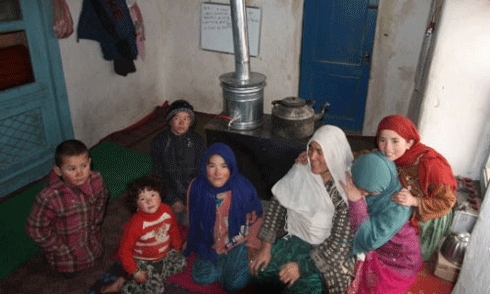
|
Published: 13 March 2012
On the boil: cleaner stoves for Afghanistan
In Afghanistan's Central Highlands, local metal-smiths, engineers and environmental experts have teamed up to design prototypes for clean cookstoves and other low-cost energy solutions which are now being tested by villagers.

|
|
This stove prototype in Afghanistan takes fumes outside the home using a vent Credit:
My Afghan Mountains/Eoin Flinn
|
More than 95 per cent of Afghanistan's estimated 30 million people burn wood and other solid fuels in their homes, mostly in traditional Afghan tandoors, drum-shaped ovens used for cooking and heating. The indoor smoke thus generated makes Afghanistan among the 10 countries worst affected by indoor pollution, according to the UN World Health Organization (WHO).
The inefficient use of dung and fuelwood is also adding to stress on the environment. For example, at the current rate of deforestation, the United Nations Environment Programme (UNEP) estimates that all Afghan forests will disappear within 30 years.
UNEP is partnering with the Government of Finland and the Conservation Organization of Afghan Mountains on a clean cookstoves and ecological restoration project in Bamyan province, a high-altitude region where rural communities have limited employment prospects, despite the region's significant ecotourism potential.
The project is expected to improve indoor air quality for thousands of families, provide employment, reduce the degradation of rangelands, and reduce greenhouse gas emissions.
The designs are informed by recent detailed local energy surveys carried out in and around Bamyan, involving a complete review of power sources, fuel usage and investment costs.
The design team has so far developed four prototypes: a tandoor (called the "Sutra", meaning “clean”), a bhukari (called the "Foladi”, meaning “iron”), improved briquettes and a solar water heater.
At the suggestion of one of the Afghan blacksmiths, the team is now experimenting with connecting the new cookstoves to vents, which takes fumes outside of the home (see image above). Villagers are involved in testing all the prototypes.
The project is part of the Global Alliance for Clean Cookstoves, which is calling for 100 million homes to adopt clean and efficient stoves and fuels by 2020 to cut the estimated 1.6 million to 1.8 million premature deaths each year linked to indoor emissions from inefficient cook stoves.
UNEP has been a founding partner of the Global Alliance since its launch in September 2010.
Inefficient cooking stoves are estimated to be responsible for approximately 25 per cent of emissions of black carbon, particles often known as soot, of which 40 per cent is linked to wood burning. The Alliance is aiming to overcome the market barriers that impede the production, deployment, and use of clean cookstoves in the developing world.
The stoves and other products produced will be traded, rather than given away.
‘As Afghanistan moves from conflict and humanitarian crises to a development-driven agenda, practical programmes focusing on economic development, labour creation and the sustainable management of the environment are a high priority,’ says Andrew Scanlon, Officer-in-Charge of the the UNEP’s Afghanisation Programme.
Source: UNEP



